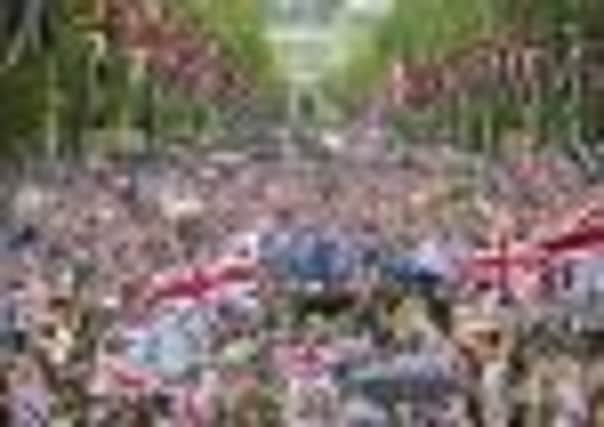Gareth Mackie: No easy remedy for growing pains


Rather than shrinking by 0.7 per cent during the second quarter of the year, as official statisticians said in their first estimate, the economy only contracted by 0.5 per cent.
However, in case anyone feels like breaking out the champagne to celebrate the revision, which was bang in line with City forecasts, we should remember that in July economists had predicted a decline of just 0.2 per cent.
Advertisement
Hide AdAdvertisement
Hide AdDespite mounting evidence that he needs to change course, the Chancellor shows no sign of abandoning his austerity plans, although the British Chambers of Commerce has urged him to supplement his spending cuts with increased infrastructure spending.
George Osborne unveiled his infrastructure plan in November, having identified more than 500 projects with a combined value of more than £250 billion. But the private sector is expected to stump up most of the cash, including billions from pension funds, and so far little has been forthcoming.
Mike Peasland, the Edinburgh-born chief executive of Balfour Beatty Construction Services UK, recently said that the pipeline of work in England and Wales was stuck.
There’s no doubt that with output down 3.9 per cent in the second quarter, the construction sector needs a boost. But perhaps the Chancellor’s focus should be on improving the supply of new housing rather than ploughing billions into major infrastructure projects such as bridges and roads.
In Dogs And Demons, his 2001 account of Japan’s attempt to prop up its ailing economy through profligate spending, Alex Kerr told of bridges to uninhabited islands and roads to nowhere, built to boost construction companies’ profits and politicians’ chances of re-election.
Japan was once the world’s second-largest economy but was overtaken by China in 2010, and the term quantitative easing (QE) was coined there in the mid-1990s, albeit by Richard Werner, a German-born economist and professor at the University of Southampton.
QE has been picked up by the UK and US, although Werner has described the Bank of England’s efforts to use it to kick-start an economic recovery as “futile”. Rather than increase lending to businesses, he says most of the money created through purchasing government bonds has been used by banks to rebuild their balance sheets and invest in commodity speculation.
Notwithstanding the odd game of strip billiards, the Royal Family has had a good year, but we’re told that the extra bank holiday for the Queen’s Diamond Jubilee celebrations knocked 0.5 per cent off the second-quarter GDP figures. Without that disruption, the economy would have been flat.
Advertisement
Hide AdAdvertisement
Hide AdDespite the upward revision, the latest GDP figures represent the biggest quarter-on-quarter fall for more than three years, and all hopes are now pinned on the Olympics to provide a boost for the third quarter.
Responding to a request from the Treasury select committee, the Bank published a report last week in which it claimed UK household wealth had been boosted by about £600bn as a result of its money-printing activities, equivalent to around £10,000 per person.
But despite Osborne’s belief that “we’re all in this together”, it turns out the benefits of the Bank’s £375bn QE programme were heavily skewed towards the top 5 per cent of households, who have an average of £175,000 in gross assets each, compared with just £1,500 for the population as a whole.
As a result of keeping interest rates at a record low of 0.5 per cent since 2009, savers have missed out on £70bn of interest payments – although the Bank claimed this has been more than offset by lower rates on credit cards, loans and mortgages.
And final-salary pension schemes that were already running at a deficit have seen their shortfalls widen because their assets and liabilities will have risen by a similar proportion. The number crunchers at Bluefin Corporate Consulting believe that the total deficit across all the UK’s final salary schemes would be – wait for it – up to £375bn smaller had QE not been introduced. That means for every pound the Bank has spent on QE, one pound has been added to pension scheme deficits.
Meanwhile, retirees who started drawing a pension before the asset purchasing programme began have lost out too, as QE has pushed up inflation, reducing the spending power of those on fixed incomes.
Inflation as measured by the consumer prices index rose to 2.6 per cent last month, up from 2.4 per cent in June as clothing and transport costs soared, but that is unlikely to prevent the Bank from starting up the printing presses again and conjure up another £50bn in the fourth quarter.
Despite its best efforts, Threadneedle Street is unable to see the economy growing at all this year, and while the third quarter’s GDP figures are expected to show a boost from the Olympics, it is difficult to see where it goes from here. A further cut in interest rates, to an unprecedented low of 0.25 per cent, might take some pressure off cash-strapped consumers but risks damaging banks’ margins.
Advertisement
Hide AdAdvertisement
Hide AdMore QE could well be on the cards, and despite the damage being down to pensioner incomes the Bank insists that we would all have been worse off without its intervention. Indeed, some economists say that if the Bank really believes that asset purchases are the way to drag us out of recession, it should expand its programme markedly.
Sir Mervyn King, whose tenure as governor comes to an end when he retires next June, is coming under increasing fire for the Bank’s forecasting and his role in the departure of former Barclays chief Bob Diamond.
His successor will inherit an even more powerful position next year when the Bank takes full responsibility for financial stability and the day-to-day suwpervision of banks. Given the current climate, this seems an unenviable task.